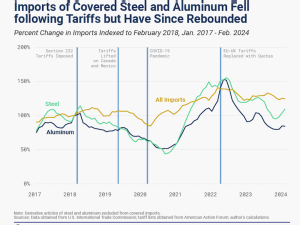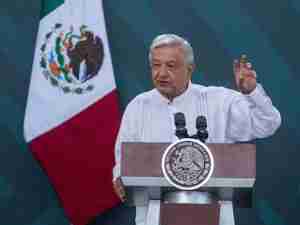China: Human Rights Will Determine Outcome of the Trade War
Mexico: USMCA Is Getting Close
If there has been bipartisanship on the Hill on anything, it’s on the current U.S.-China tariff war, and now, in more recent weeks, on addressing China’s human rights practices. In fact, the U.S. response to China’s human rights practices may determine the outcome of the tariff war. It is already impacting negotiations.
First, in regard to the U.S.-China trade relationship—specifically, the U.S. imposition of increased tariffs on imports from China (and China’s retaliatory tariffs): Both D’s and R’s are telling Trump to stay tough, and that he’d better come up with something good—for example, getting China to change its bad trade practices. We (the U.S. trade community) need to get something for the pain caused by the tariffs.
Let’s remember, no trade deal has ever been popular on Capitol Hill. If they pass, they do so just barely, with vigorous and bitter opposition. Such was the case with NAFTA 30 years ago, and with allowing China into the World Trade Organization. The Trans-Pacific Partnership was opposed by both the R and D presidential candidates and was defeated in a test vote in the House. So whatever deal we get on NAFTA’s replacement, the U.S.-Mexico-Canada Agreement (USMCA), or with China on tariffs, half of Congress will oppose it—most for political reasons, some for substantive reasons. Nothing new.
Next, will USMCA pass? The short answer is “yes.” The Senate is committed to passing it, and the President wants it done. Labor unions are saying Mexico’s commitments to increase wages and working standards are not good enough. Nonetheless, we sense that Speaker of the House Pelosi is setting the stage for House passage in the next few months.
Back to China: Congress sent a veto-proof bill to the President addressing China’s brutal repression of civil liberties in Hong Kong. This put the President in a tough position: either sign the bill and anger China in the midst of trade negotiations, or don’t sign it and look weak on defending liberties of Hong Kong residents. He signed it. What this does to China’s willingness to make the trade commitments we seek remains to be seen.
Now Congress is passing another bill that will anger China equally, sanctioning China for its repression of the Uyghur ethnic minorities in Western China. The House passed a version by 407 to 1. Clearly bipartisan condemnation. Soon a version of this bill will put the President in the same situation as the Hong Kong bill did: should he sign it, standing up for human rights even though it will anger China and jeopardize the trade negotiations? My bet is that he will do as he did with the Hong Kong bill—sign it.
Clearly, the issue of human rights has bumped trade from the limelight. Congress has not passed a bill on the ongoing U.S.-China trade dispute, but it is on the verge of passing a second bill sanctioning China for its human rights practices (the first on Hong Kong, and now about the Uyghurs). China has already retaliated, restricting U.S. naval access to Hong Kong along with other measures.
In this environment, it is difficult to expect much progress on the trade front. It is quite possible that the U.S. tariffs on China’s exports, and China’s retaliatory tariffs on our exports, could remain in place for another year—at least until the November 2020 presidential and congressional elections.







